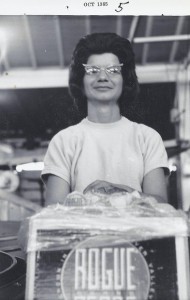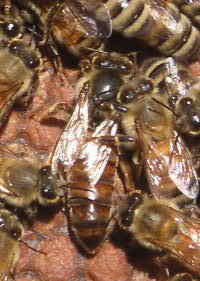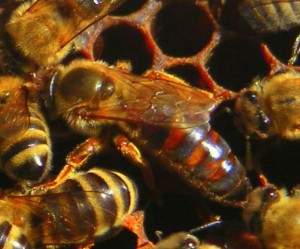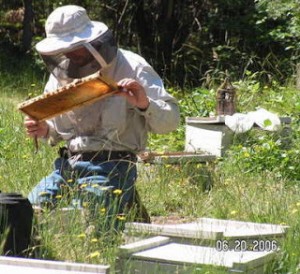
Old Sol Apiaries has worked to produce better bees by incorporating the best available genetics and breeding practices since our inception in 1997. These practices include the use of strong selection pressure to test for colony fitness, hygienic behavior testing, and robust data collection on things like mite loads and productivity. Over the years our Survivor Stock has been developed from many lines including Minnesota Hygienic, Carniolan, Ferals, Russian, VSH, SMR and more recently Caucasians. Working with such a broad array of genetics helps maintain a large number of alleles in our breeding population. This degree of genetic diversity helps maintain sustainability and adaptability in honeybee populations. Our goal is to produce productive, hearty, pest and disease tolerant bee, that is also a pleasure to work with. Properly managed our bees are known for their rapid early build up, massive honey honey crops and frugal winter heartiness. Whether you are a commercial pollinator, honey maker, or hobbyist Old Sol’s double vetted queens will faithfully put honey and food on the table.
Old Sol Enterprises is a family run business that has striven to promote sustainable agriculture and a healthy environment since its inception in 1997.
The pursuit of these endeavors has taken our family down many interesting and enlightening paths which have allowed Old Sol’s founder, John Jacob, to follow his deepest convictions by expanding and utilizing his educational background (B.S. in Biology, with Minors in Chemistry and Economics).
We recognize that sustainable agriculture and a clean, healthy environment will require our global culture adopting a new paradigm. Elements of this new model will , most likely, include an Integrated Pest Management (IPM) approach to crop production, support of local businesses, elements of organic farming and innovative, dual use of farmland to produce income and preserve habitat.
The consequences of the “old ways” of doing things have been dire and have led to many insidious and intractable problems, including the release of toxic chemicals into our environment, habitat loss and a treadmill of pesticide addiction as pests and pathogen species evolve resistance to an ever increasing number of insecticides and antibiotics. We have an on-site Biologist specializing in entomology with many years of field experience with honey bees and horticulture.
These principles are incorporated into Old Sol’s daily apiary operations. Vexing problems, such as Varroa mites, are controlled with an IPM approach which includes, food grade essential oils, data collection, sustainable use of acaricides, and most importantly a cutting edge bee breeding program.


Our quest for a better bee began with Minnesota Hygienic Italians and New World Carniolans. After a few disappointing years of heavy losses to Varroa mites using these lines of bees; Old Sol began participating in several Department of Agriculture sponsored breeding programs. In 1999 Old Sol was one of the first handful of bee breeders to acquire USDA Russian mite resistant stocks.
These lines of bees were a vast improvement; but still no silver bullet for the parasitic mite syndrome (PMS) and losses to Varroa continued. However several descendants managed to survive and continue to show some level of mite tolerance. By 2002, many of the most susceptible lines of bees had naturally been winnowed from our gene pool, and another line of mite resistant bees had been developed and released by The USDA Honey Bee Breeding and Genetics Laboratory. These bees developed by Doctors Harbo and Harris are known as Suppressed Mite Reproduction (SMR) or Smart Bees. SMR queens were eagerly incorporated into our honey bee improvement program, and after many years of careful selection and hybridization we have derived several lines of hygienic, substantially Varroa tolerant stock. Great genetics will produce a positive effect on over all mite loads, however they are still not a substitute for gathering empirical data and making wise management choices. Our breeder queens were initially developed from untreated survivor stock and since then, we have learned proper mite management is a key component to beekeeping success. Selection criteria that we work to incorporate include gentleness, fecundity, and honey production. These traits, along with proven and careful production techniques, yield colonies that produce honey and pollinate the crops that feed the world.


